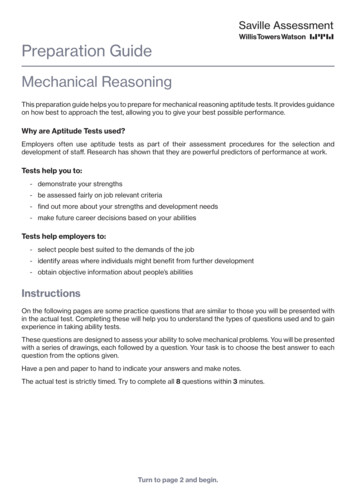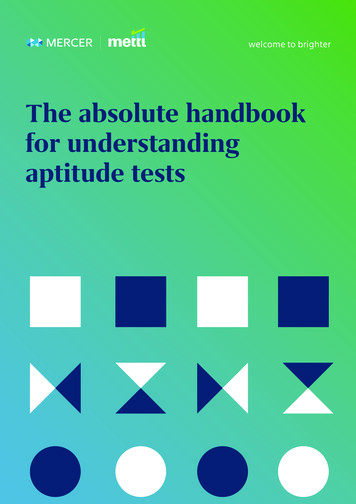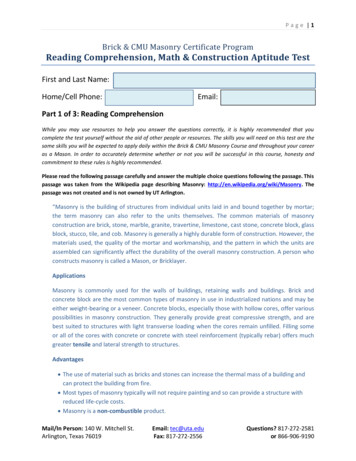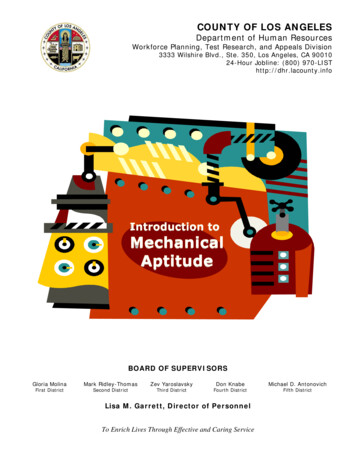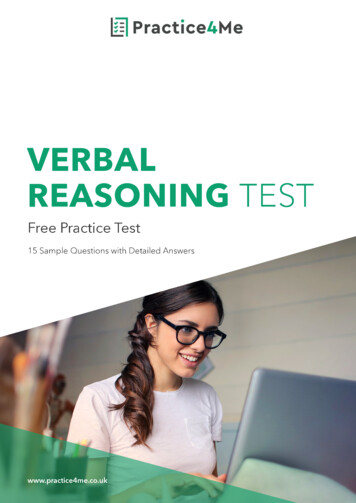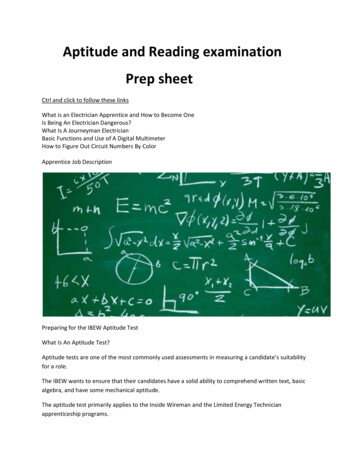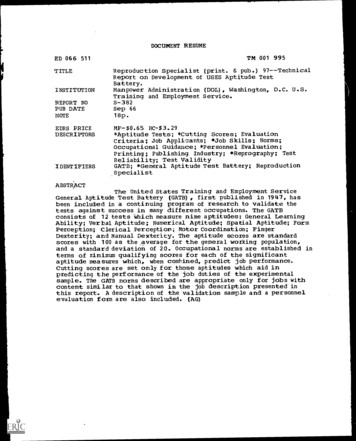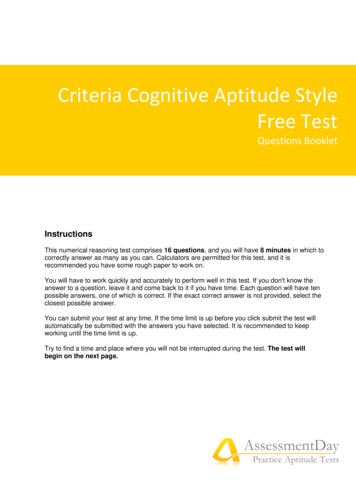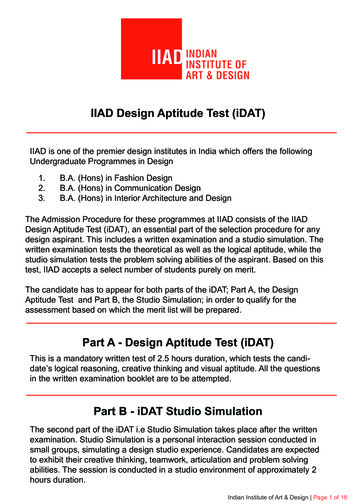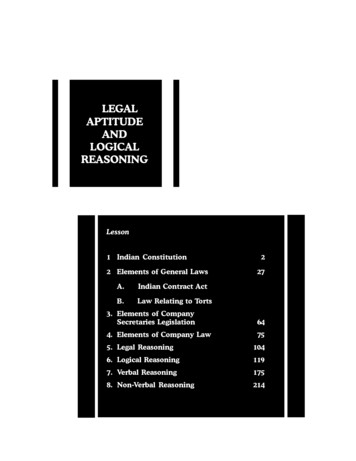
Transcription
Legal Aptitude and Logical Reasoning1LEGALAPTITUDEANDLOGICALREASONINGLesson1 Indian Constitution2 Elements of General LawsA.Indian Contract ActB.Law Relating to Torts2273. Elements of CompanySecretaries Legislation644. Elements of Company Law755. Legal Reasoning1046. Logical Reasoning1197. Verbal Reasoning1758. Non-Verbal Reasoning214
2April2022Legal Aptitude and Logical ReasoningDisclaimer : Although due care and diligence have been taken in preparation of this reference reading material, theInstitute shall not be responsible for any loss or damage, resulting from any action taken on the basis of the contents of thismaterial. Anyone wishing to act on the basis of the material contained herein should do so after cross checking with theoriginal source.
PART ALEGAL APTITUDE1
2Legal Aptitude and Logical ReasoningLesson 1INDIANCONSTITUTIONPREAMBLEWE, THE PEOPLE OF INDIA, having solemnlyresolved to constitute India into SOVEREIGNSOCIALIST SECULAR DEMOCRATIC REPUBLICAnd to secure to all its citiZens:JUSTICE, social, economic and political;LIBERTY of thought, expression, belief, faith andworship;EQUALITY of status and of opportunity; and topromote Among them allFRATERNITY ASSuring the dignity of the individualand the unity and integrity of the Nation;IN OUR CONSTITUENT ASSEMBLY this twenty-sixthday of November, 1949, do HEREBY ADOPT, ENACTAND GIVE TO OURSELVES THIS CONSTITUTION2
Legal Aptitude and Logical Reasoning3INTRODUCTIONThe Constitution which lays down the basic structure of a nation's polity is built on the foundations ofcertain fundamental values. The vision of our founding fathers and the aim and objectives which theywanted to achieve through the Constitution are contained in the Preamble, the Fundamental Rights andthe Directive Principles. These three may be described as the soul of the Constitution and the testamentof founding fathers to the succeeding generations together with the later Part on Fundamental Duties.The vision of socio-economic change through the Constitution is reflected in its Preamble. The Preambleexpresses the ideals and aspirations of a renascent India. At independence, emerging out of a long periodof foreign domination and oppression under a feudal system, the people were grimly struggling to bereborn into a life of dignity and hope.The scheme of the Constitution for realisation of socio-economic agenda comprises of both the justiciableFundamental Rights as well as the non-justiciable Directive Principles. The judicial contribution to thesynthesis and the integration of Fundamental Rights and the Directive Principles in the process of"constitutionalising" social and economic rights has been crucial to the realisation of the Directive Principlesnot only as a means to effectuate Fundamental Rights but also as a source of laws for a welfare state.(Source: Report of the National Commission to Review the Working of the Constitution, 31st March, 2002)The Constitution places a pre-eminent emphasis on the values of liberty and justice, on treating all citizensas equal before law and on safeguarding the rights of minorities and the oppressed. The people of Indiaderive their existence as a political community from the Constitution, which “we the people”, gave toourselves and, in the process established the Republic of India. It is because the country is Republic, andnot a mere democracy, that the people are enjoined to nurture and indeed celebrate, their linguistic,ethnic, cultural and religious diversity and to ensure that the citizens do not suffer from want and indignity.Though the Indian tapestry of traditional multiculturism nourished by many centuries of assimilativeforces has been subjected to occasional fissures, the most diverse nation on earth has been able toovercome those crises and use the innate strength of Indian Republic to uphold the dignity and integrityof India.Broad Framework of the ConstitutionThe Constitution of India came into force on January 26, 1950. It is a comprehensive document. Apartfrom dealing with the structure of Government, the Constitution makes detailed provisions for the rightsof citizens and other persons in a number of entrenched provisions and for the principles to be followedby the State in the governance of the country, labelled as “Directive Principles of State Policy”. All publicauthorities – legislative, administrative and judicial derive their powers directly or indirectly from theConstitution which in turn derive its authority from the people.The preamble to the Constitution sets out the aims and aspirations of the people of India. It is a part of theConstitution. The preamble declares India to be a Sovereign, Socialist, Secular, Democratic Republic andsecures to all its citizens Justice, Liberty, Equality and Fraternity. It is declared that the Constitution hasbeen given by the people to themselves, thereby affirming the republican character of the polity and thesovereignty of the people.The polity assured to the people of India by the Constitution is described in the preamble as a Sovereign,Socialist, Secular, and Democratic Republic. The expression “Sovereign” signifies that the Republic isexternally and internally sovereign. Sovereignty in the strict and narrowest sense of the term impliesindependence all round, within and without the borders of the country. As discussed above, legalsovereignty is vested in the people of India and political sovereignty is distributed between the Union andthe States.The democratic character of the Indian polity is illustrated by the provisions conferring on the adult
4Legal Aptitude and Logical Reasoningcitizens the right to vote and by the provisions for elected representatives and responsibility of the executiveto the legislature.The word “Socialist”, added by the 42nd Amendment, aims to secure to its people “justice—social,economic and political”. The Directive Principles of State Policy, contained in Part IV of the Constitutionare designed for the achievement of the socialistic goal envisaged in the preamble. The expression“Democratic Republic” signifies that our government is of the people, by the people and for the people.Federal or UnitaryConstitution of India is basically federal but with certain unitary features. The majority of the SupremeCourt judges in Kesavananda Bharati v. State of Kerala, AIR 1973 SC 1461, were of the view that the federalfeatures form the basic structure of Indian Constitution. However, there are discussions as to whether theIndian Constitution establishes a federal system or it stipulates a unitary form of Government with somebasic federal features. Thus, to decide whether Constitution is federal, unitary or quasi federal, it would bebetter to have a look at the contents of the Constitution.The essential features of a Federal Polity or System are—dual Government, Distribution of Powers,Supremacy of the Constitution, Independence of Judiciary, Written Constitution, and a rigid procedurefor the amendment of the Constitution.The political system introduced by our Constitution possesses all the aforesaid essentials of a federal polityas both the Union and the State Governments and their respective organs derive their authority from theConstitution and it is not competent for the States to secede from the Union. There is a division oflegislative and executive powers between the Union and the State Governments. The Supreme Courtstands at the head of our judiciary to guard against the violation of the constitutional provisions. TheSupreme Court decides disputes between the Union and the States, or the States inter se and interpretsfinally the provisions of the Constitution.The question as to whether the Indian Constitution has a federal form of Government or a unitaryconstitution with some federal features came up in various cases before the Supreme Court and theHigh Courts. But in most cases, the observations have been made in a particular context and have to beunderstood accordingly. The question rests mostly on value judgement i.e. on one’s own philosophy.FUNDAMENTAL RIGHTSThe Constitution seeks to secure to the people “liberty of thought, expression, belief, faith and worship;equality of status and of opportunity; and fraternity assuring the dignity of the individual”. With this object,the fundamental rights are envisaged in Part III of the Constitution.Part III of the Indian Constitution guarantees six categories of fundamental rights. These are:— Right to Equality — Articles 14 to 18;— Right to Freedom — Articles 19 to 22;— Right against Exploitation — Articles 23 and 24;— Right to Freedom of Religion — Articles 25 to 28;— Cultural and Educational Rights — Articles 29 and 30;— Right to Constitutional Remedies — Articles 32.Previously the right to property under Article 31 was also guaranteed as a Fundamental Right which hasbeen removed by the 44th Constitutional Amendment Act, 1978. Now right to property is not a fundamentalright, it is now only a legal right.
Legal Aptitude and Logical ationalRightsRightagainstExploitationRightto Freedom ofReligionApart from this, Articles 12 and 13 deal with definition of ‘State’ and ‘Law’ respectively. Articles 33 to 35deal with the general provisions relating to Fundamental Rights.No fundamental right in India is absolute and reasonable restrictions can be imposed in the interest of thestate by valid legislation and in such case the Court normally would respect the legislative policy behindthe same.( People’s Union for Civil Liberties v. Union of India, (2004) 2 SCC 476).From the point of view of persons to whom the rights are available, the fundamental rights may be classifiedas follows:(a) Articles 15, 16, 19 and 30 are guaranteed only to citizens.(b) Articles 14, 20, 21, 22, 23, 25, 27 and 28 are available to any person on the soil of India—citizen orforeigner.(c) The rights guaranteed by Articles 15, 17, 18, 20, 24 are absolute limitations upon the legislativepower.StateWith a few exceptions, all the fundamental rights are available against the State. Under Article 12, unlessthe context otherwise requires, “the State” includes—
6Legal Aptitude and Logical Reasoning(a) the Government and Parliament of India;(b) the Government and the Legislature of each of the States; and(c) all local or other authorities:(i) within the territory of India; or(ii) under the control of the Government of India.The expression ‘local authorities’ refers to authorities like Municipalities, District Boards, Panchayats,Improvement Trusts, Port Trusts and Mining Settlement Boards. In Ajay Hasia v. Khalid Mujib, AIR 1981 SC481, the Supreme Court has enunciated the following test for determining whether an entity is aninstrumentality or agency of the State:(1) If the entire share capital of the Corporation is held by the Government, it would go a long waytowards indicating that the corporation is an instrumentality or agency of the Government.(2) Where the financial assistance of the State is so much as to meet almost the entire expenditure ofthe corporation it would afford some indication of the corporation being impregnated withgovernment character.(3) Whether the corporation enjoys a monopoly status which is conferred or protected by the State.(4) Existence of deep and pervasive State control may afford an indication that the corporation is aState agency or an instrumentality.(5) If the functions of the corporation are of public importance and closely related to governmentfunctions, it would be a relevant factor in classifying a corporation as an instrumentality or agencyof government.(6) If a department of government is transferred to a corporation, it would be a strong factor supportingan inference of the corporation being an instrumentality or agency of government.Example : An act is passed by the parliament. The subject matter of the Act was to grant certain payrelated benefits to all employees of the State. Are only states of India(eg. State of Maharashtra or UttarPradesh) are required to comply with law?According to Article 12 of the constitution the word state includes not only States of India but alsocertain other authorities/ Organisations.Justifiability of Fundamental RightsArticle 13 gives teeth to the fundamental rights. It lays down the rules of interpretation in regard to lawsinconsistent with or in derogation of the Fundamental Rights.Existing Laws : Article 13(1) relates to the laws already existing in force, i.e. laws which were in force beforethe commencement of the Constitution. A declaration by the Court of their invalidity, however, will benecessary before they can be disregarded and declares that pre-constitution laws are void to the extentto which they are inconsistent with the fundamental rights.Future Laws : Article 13(2) relates to future laws, i.e., laws made after the commencement of the Constitution.After the Constitution comes into force the State shall not make any law which takes away or abridges therights conferred by Part III and if such a law is made, it shall be void to the extent to which it curtails anysuch right.
Legal Aptitude and Logical Reasoning7The word ‘law’ according to the definition given in Article 13 itself includes—“. any Ordinance, order, bye-law, rule, regulation, notification, custom or usage havingin the territory of India, the force of law.”By the Constitution (Twenty-Fourth Amendment) Act, 1971 a new clause has been added to Article 13which provides that—“Nothing in this Article shall apply to any amendment of this Constitution made under Article368”Article 13 came up for judicial review in a number of cases and the Courts have evolved doctrines likedoctrine of eclipse, severability, prospective overruling, acquiescence etc. for interpreting the provisionsof Article 13.Example: There was a Law in force before 26th January, 1950 which was against the FundamentalRights. It was contended that it can still be in force as the constitution does not make it void. Is thecontention correct?According to Article 13(1) of the Constitution of India, all the laws that are inconsistent with FundamentalRights are void.Right of equalityArticles 14 to 18 of the Constitution deal with equality and its various facets. The general principle LITYAbolitionofUntouchabilityProhibition ofDiscriminationon Grounds ofReligion, Race,Caste, Sex orPlace of BirthEqualityofOpportunity inMatters of PublicEmployment
8Legal Aptitude and Logical Reasoningexpression in Article 14. Particular applications of this right are dealt with in Articles 15 and 16. Still morespecialised applications of equality are found in Articles 17 and 18.Equality before the law and equal protection of the lawsArticle 14 of the Constitution says that “the State shall not deny to any person equality before the law orthe equal protection of the laws within the territory of India”.As is evident, Article 14 guarantees to every person the right to equality before the law or the equalprotection of the laws. The expression ‘equality before the law’ which is barrowed from English CommonLaw is a declaration of equality of all persons within the territory of India, implying thereby the absence ofany special privilege in favour of any individual. Every person, whatever be his rank or position is subjectto the jurisdiction of the ordinary courts.The second expression “the equal protection of the laws” which is based on the last clause of the firstsection of the Fourteenth Amendment to the American Constitution directs that equal protection shallbe secured to all persons within the territorial jurisdiction of the Union in the enjoyment of their rights andprivileges without favouritism or discrimination.Article 14 applies to all persons and is not limited to citizens. A corporation, which is a juristic person, is alsoentitled to the benefit of this Article (Chiranjit Lal Chowdhurary v. Union of India, AIR 1951 SC 41). The rightto equality is also recognised as one of the basic features of the Constitution (Indra Sawhney v. Union ofIndia, AIR 2000 SC 498).Example: A law has been passed for grant of financial assistance to women below the Age of 14 years foreducation. It was contented that there shall be equality before the law. Can it be passed?Yes, it can be passed if the Legislation is based on reasonable classification and intelligible differentia.Prohibition of discrimination on grounds of religion etc.Article 15(1) prohibits the State from discriminating against any citizen on grounds only of:(a) Religion(b) Race(c) Caste(d) Sex(e) Place of birth or(f) Any of themArticle 15(2) lays down that no citizen shall be subjected to any disability, restriction or condition withregard to—(a) Access to shops, public restaurants, hotels and places of public entertainment; or(b) The use of wells, tanks, bathing ghats, roads and places of public resort, maintained wholly orpartially out of State funds or dedicated to the use of the general public.Article 15(3) and 15(4) and 15(5) and 15(6) create certain exceptions to the right guaranteed by Article15(1) and 15(2). Under Article 15(3) the State can make special provision for women and children. It isunder this provision that courts have upheld the validity of legislation or executive orders discriminatingin favour of women (Union of India v. Prabhakaran, (1997) 2 SCC 633).
Legal Aptitude and Logical Reasoning9Article 15(4) permits the State to make special provision for the advancement of—(a) Socially and educationally backward classes of citizens;(b) Scheduled Castes; and(c) Scheduled tribes.Article 15(5) inserted in the Constitution of India by the Constitution (Ninety-third Amendment) Act,2005, permits the State to make special provision for the advancement of any socially and educationallybackward classes of citizens or for the Scheduled Castes or the Scheduled Tribes in so far as such specialprovisions relate to their admission to educational institutions including private educational institutions,whether aided or unaided by the State, other than the minority educational institutions referred to inclause (1) of article 30.Further, Article 15(6) inserted in the Constitution of India by the Constitution (One Hundred and ThirdAmendment) Act, 2019, provides that nothing in this article or sub-clause (g) of clause (1) of article 19 orclause (2) of article 29 shall prevent the State from making,—(a) any special provision for the advancement of any economically weaker sections of citizens otherthan the classes mentioned in clauses (4) and (5); and(b) any special provision for the advancement of any economically weaker sections of citizens otherthan the classes mentioned in clauses (4) and (5) in so far as such special provisions relate to theiradmission to educational institutions including private educational institutions, whether aidedor unaided by the State, other than the minority educational institutions referred to in clause (1)of article 30, which in the case of reservation would be in addition to the existing reservationsand subject to a maximum of ten per cent. of the total seats in each category.Explanation.—For the purposes of Article 15 and Article 16, "economically weaker sections" shall be suchas may be notified by the State from time to time on the basis of family income and other indicators ofeconomic disadvantage.Example: Fundamental Right have been given to the citizens but they are not without any restrictions.Certain exceptions are also provided with the Fundamental rights.Equality of opportunity in matters of public employmentArticle 16(1) guarantees to all citizens equality of opportunity in matters relating to employment orappointment of office under the State.Article 16(2) prohibits discrimination against a citizen on the grounds of religion, race, caste, sex descent,place of birth or residence.However, there are certain exceptions provided in Article 16(3), 16(4) and 16(5). These are as under:(1) Parliament can make a law that in regard to a class or classes of employment or appointment to anoffice under the Government of a State or a Union Territory, under any local or other authoritywithin the State or Union Territory, residence within that State or Union Territory prior to suchemployment or appointment shall be an essential qualification. [Article 16(3)](2) A provision can be made for the reservation of appointments or posts in favour of any backwardclass of citizens which in the opinion of the State is not adequately represented in the servicesunder the State. [Article 16(4)](3) Nothing in this article shall prevent the State from making any provision for reservation in mattersof promotion, with consequential seniority, to any class or classes of posts in the services under
10Legal Aptitude and Logical Reasoningthe State in favour of the Scheduled Castes and the Scheduled Tribes which, in the opinion of theState, are not adequately represented in the services under the State. [Article 16(4A)](4) Nothing in this article shall prevent the State from considering any unfilled vacancies of a yearwhich are reserved for being filled up in that year in accordance with any provision for reservationmade under clause (4) or clause (4A) as a separate class of vacancies to be filled up in anysucceeding year or years and such class of vacancies shall not be considered together with thevacancies of the year in which they are being filled up for determining the ceiling of fifty per cent.reservation on total number of vacancies of that year. [Article 16(4B)](5) A law shall not be invalid if it provides that the incumbent of an office in connection with the affairof any religious or denominational institution or any member of the governing body thereof shallbe a person professing a particular religion or belonging to a particular denomination. [Article16(5)](6) Nothing in this article shall prevent the State from making any provision for the reservation ofappointments or posts in favour of any economically weaker sections of citizens other than theclasses mentioned in clause (4), in addition to the existing reservation and subject to a maximumof ten per cent. of the posts in each category. [Article 16(6)]Abolition of untouchabilityArticle 17 says that “Untouchability” is abolished and its practice in any form is forbidden. The enforcementof any disability arising out of “Untouchability” shall be an offence punishable in accordance with law.Untouchability does not include an instigation to social boycott (Davarajiah v. Padamanna, AIR 1961Mad. 35, 39). Punishment for violation of Article 17 is to be provided by Parliament under Article 35(a) (ii).Abolition of titlesArticle 18 is more a prohibition rather than a fundamental right. British Government used to confer titlesupon persons who showed special allegiance to them. Many persons were made Sir, Raj Bahadur, RaiSaheb, Knight, etc. These titles had the effect of creating a class of certain persons which was regardedsuperior to others and thus had the effect of perpetuating inequality. To do away with that practice, Article18 provides as under:(i) No title, not being a military or academic distinction, shall be conferred by the State.(ii) No citizen of India shall accept any title from any foreign State.(iii) No person, who is not a citizen of India shall, while he holds any office or trust under the State,accept without the consent of the President, any title from any foreign State.(iv) No person, holding any office of profit or trust under State shall without the consent of thePresident, accept any present, emolument or office of any kind from or under a foreign State.Rights Relating to FreedomArticles 19-22 guarantee certain fundamental freedoms.The Six Freedoms of CitizensArticle 19(1), of the Constitution, guarantees to the citizens of India six freedoms, namely:(a) Freedom of speech and expression;(b) Assemble peaceably and without arms;
Legal Aptitude and Logical Reasoning11(c) Form associations or unions or co-operative societies(d) Move freely, throughout the territory of India;(e) Reside and settle in any part of the territory of India;(f) Sub-clause (f) is omitted by section 2 of the Constitution (Forty-fourth Amendment) Act, 1978;(g) practise any profession, or to carry on any occupation, trade or business.These freedoms are those great and basic rights which are recognized as the natural rights inherent in thestatus of a citizen. At the same time, none of these freedoms is absolute but subject to reasonable restrictionsspecified under clauses (2) to (6) of the Article 19. The Constitution under Articles 19(2) to 19(6) permitsthe imposition of restrictions on these freedoms subject to the following conditions:(a) The restriction can be imposed by law and not by a purely executive order issued under a statute;(b) The restriction must be reasonable;(c) The restriction must be imposed for achieving one or more of the objects specified in the respectiveclauses of Article 19.Article 19(2) specifies the limits upto which the freedom of speech and expression may be restricted. Itenables the Legislature to impose by law reasonable restrictions on the freedom of speech and expressionunder the following heads:Permissible Restrictions(1) Sovereignty and integrity of India(2) Security of the State(3) Friendly relations with foreign States(4) Public Order(5) Decency or morality(6) Contempt of court(7) Defamation(8) Incitement to an offenceReasonable restrictions under these heads can be imposed only by a duly enacted law and not by theexecutive action [Express News Papers Pvt. Ltd. v. Union of India, (1986) 1 SCC 133].Example: A certain class of persons were denied to form co-operative societies. They contended that it istheir fundamental right to form co-operative societies. Is the contention correct?Yes, it is the fundamental right of citizen to form co-operatives socities.Protection of Life and Personal LibertyArticle 21 confers on every person the fundamental right to life and personal liberty. It says that,“No person shall be deprived of his life or personal liberty except according to procedureestablished by law.”The right to life includes those things which make life meaningful. The right to life enshrined in Article 21guarantees right to live with human dignity. Right to live in freedom from noise pollution is a fundamental
12Legal Aptitude and Logical ReasoningSovereigntyand integrityof IndiaSecurityof theStateFriendlyrelationswith ofcourtDefamationIncitementto anoffence
Legal Aptitude and Logical Reasoning13right protected by Article 21 and noise pollution beyond permissible limits is an inroad into that right.(Noise Pollution (v), in re, (2005) 5 SCC 733).In Satwant Singh Sawhney v. A.P.O., New Delhi, AIR 1967 S.C. 1836, it was held that right to travel isincluded within the expression ‘personal liberty’ and, therefore, no person can be deprived of his right totravel, except according to the procedure established by law. Since a passport is essential for the enjoymentof that right, the denial of a passport amounts to deprivation of personal liberty. In the absence of anyprocedure pescribed by the law of land sustaining the refusal of a passport to a person, it’s refusal amountsto an unauthorised deprivation of personal liberty guaranteed by Article 21.Procedure established by law : The expression ‘procedure established by law’ means procedure laid downby statute or procedure prescribed by the law of the State. Accordingly, first, there must be a law justifyinginterference with the person’s life or personal liberty, and secondly, the law should be a valid law, andthirdly, the procedure laid down by the law should have been strictly followed.The procedure must befair, just and reasonable. It must not be arbitrary, fanciful or oppressive.Right to EducationAccording to Article 21A of the Constitution of India, the State shall provide free and compulsory educationto all children of the age of six to fourteen years in such manner as the State may, by law, determine.Protection against arrest and detention in certain casesAccording to Article 22 of the Constitution of India no arrestedperson shall be detained in custody without being informed, ofthe grounds for such arrest nor shall he be denied the right toconsult, and to be defended by, a legal practitioner of his choice.Further, every arrested person and who is detained in custodyshall be produced before the nearest magistrate within a periodof twenty-four hours of such arrest excluding the time necessaryfor the journey from the place of arrest to the court of themagistrate and no such person shall be detained in custodybeyond the said period without the authority of a magistrate.However, the protection is not available to an enemy alien anda person arrested or detained under any law providing forpreventive detention.Right against ExploitationAccording to, Article 23 of Constitution of India traffic in humanbeings and begar and other similar forms of forced labour areprohibited and any contravention of Article 23 shall be anoffence punishable in accordance with law. Further, as perArticle 24 of Constitution of India, no child below the age offourteen years shall be employed to work in any factory or mineor engaged in any other hazardous employment.RIGHTAGAINSTEXPLOITATIONProhibition of traffic inhuman beings andforced labourProhibition ofemployment ofchildren in factories,etc.
14Legal Aptitude and Logical ReasoningRight to Freedom of ReligionArticles 25, 26, 27 and 28 of Constitution of India deals with right to Freedom of Religion.RIGHT TOFREEDOMOFRELIGIONFreedom of conscienceand free profession,practice andpropagation of religionFreedomtomanage religiousaffairsFreedom as to payment of taxes forpromotion of anypart
4 Legal Aptitude and Logical Reasoning Constitution has been given by the people to themselve s, thereby affirming the republican character of the polity and the sovereignty of the people. The polity assured to the people of India by the Con stitution is described in the preamble as a

